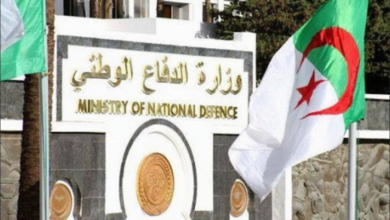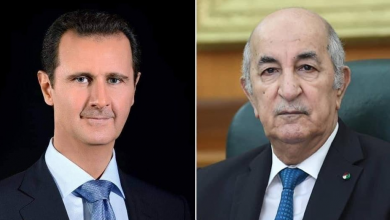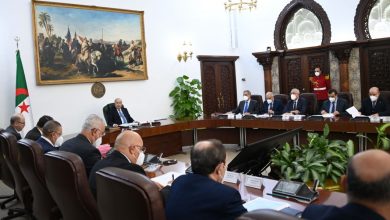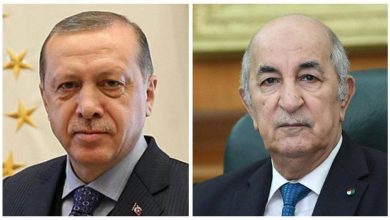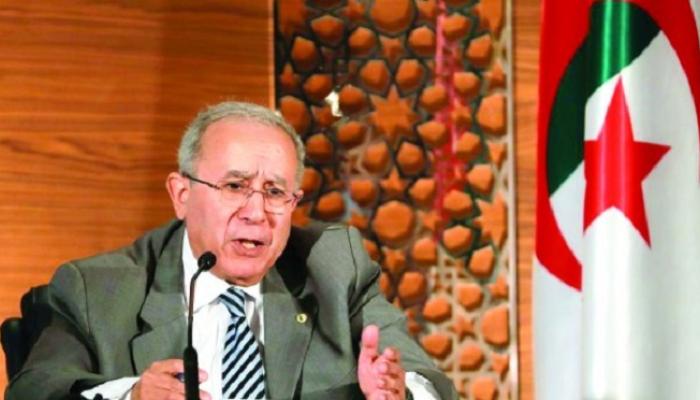
Minister of Foreign Affairs and the National Community Abroad, Ramtane Lamamra, made a statement today, Tuesday, during which he announced Algeria’s severing of diplomatic relations with Morocco.
Here is the full text of the minister’s statement:
Pursuant to the announcement by the Supreme Security Council of its decision regarding Algerian Moroccan relations, allow me to read to you the following official statement, on behalf of the President of the Republic, Supreme Commander of the Armed Forces, Minister of National Defense, and on behalf of the Algerian government:
1- It has been historically proven, with all objectivity, that the Kingdom of Morocco has never stopped carrying out unfriendly, hostile and despicable acts against our country since Algeria’s independence. This well-documented hostility, of a systematic and premeditated nature, dates back to the 1963 open war of aggression launched by the Moroccan Royal Armed Forces against newly independent Algeria. A war, marked by Morocco’s use of heavy and lethal weapons and military equipment, left at least 850 Algerian martyrs who sacrificed their lives in order to preserve the territorial integrity of their homeland, which they had previously contributed to liberating.
2- Despite the great wounds left by this armed conflict, Algeria has worked hard to establish normal relations with neighboring Moroccan. From that point, the Treaty of Brotherhood, Good Neighborliness and Cooperation, as well as the border demarcation agreement between the two countries, signed in Ifrane in 1969 and Rabat in 1972, came to establish the principle of the inviolability of borders inherited after independence.
3- In 1976, Morocco suddenly decided to severe diplomatic relations with Algeria, which at that time, along with a number of other sister countries, took the sovereign decision to recognize the Sahrawi Arab Democratic Republic. After twelve years of severing diplomatic relations, the two countries decided in 1988 to normalize bilateral relations and include them within a historical perspective that takes into account the “common fate of the Algerian and Moroccan peoples” and the need to enhance fruitful cooperation between the two countries. This normalization came after the commendable and praiseworthy efforts made by the heads of a number of sister and friendly countries, including the Custodian of the Two Holy Mosques King Fahd bin Abdulaziz, whose personal commitment to effective mediation enabled the creation of an appropriate political climate that allowed for the positive development of the situation.
It is worth recalling, in this context, that the Algerian Moroccan joint statement issued on May 16, 1988, which represents the basis and the ground for the resumption of diplomatic relations between the two countries, was formulated within an ambitious and responsible perspectives, as it included 4 important criteria that made the normalization of relations between the two countries possible, these four commitments stemming from the Algerian Moroccan joint statement are summarized as follows:
The desire to strengthen permanent relations based on peace, good neighbourliness and cooperation between the Algerian and Moroccan peoples, and to reaffirm the full validity of the treaties and agreements concluded between the two countries, to contribute effectively to accelerating the construction of the Great Arab Maghreb, to contribute to strengthening the Arab ranks on the sacred Palestinian cause, in a way that enshrines the national rights of the Palestinian people, foremost among which its right to establish its own state and liberate all occupied Arab lands, including the city of Al-Quds Al-Sharif, to support – the joint statement said – “a just and final solution to the Western Sahara conflict through the organization of a free and fair self-determination referendum that allows the Sahrawi people to determine their destiny in full credibility and without any coercion.” .
4- In accordance to its well-known principles, Algeria refuses to interfere in the internal affairs of the Kingdom of Morocco, whatever the circumstances. Algeria’s historically documented positions have clearly demonstrated this principled position, especially during serious political and security crises that threatened the stability and security of the Kingdom of Morocco. For their part, the Moroccan security and propaganda services are waging a despicable and large-scale media war against Algeria, its people and leaders, without hesitation in weaving fictional scenarios, creating rumors and spreading ill intended information. More seriously, one of the kingdom’s officials made a very dangerous and irresponsible deviation by addressing what he called “the right of self-determination for the brave Kabyle people.” In the face of this provocation that reached its limit, Algeria demonstrated its restraint by publicly demanding clarification from a competent and qualified Moroccan authority. However, the silence of the Moroccan side in this regard, which has continued since last July 16, clearly reflects the political support of the highest Moroccan authority for this act.
5- It is clear, today, that the Kingdom of Morocco has seriously and systematically abandoned, in whole or in part, the basic commitments that constitute the basic foundation and the ground of reference upon which the process of normalizing relations between the two countries is based. The Kingdom of Morocco has made its national soil a rear base and spearhead for planning, organizing and supporting a series of serious and systematic attacks against Algeria, the last of which was represented in the false accusations and implicit threats made by the Israeli Foreign Minister during his official visit to Morocco, in the presence of his Moroccan counterpart, who was clearly the main instigator of such unjustified statements.
It should be noted that since 1948, no member of an “Israeli government” has been heard issuing rulings or personally directing aggressive messages from the territory of an Arab country against another neighboring Arab country. This contradicts all the Algerian Moroccan customs and agreements. This phenomenon indicates extreme hostility and reckless impulsiveness without the slightest limitation or restraint.
In terms of regional security, the Moroccan authorities granting of a base to foreign military force in the Maghreb and inciting its representative to make false and ill intended statements against a neighboring country constitute a dangerous and irresponsible act that violates the provisions of Article 5 of the Treaty of Brotherhood, Good Neighborliness and Cooperation concluded between Algeria and Morocco, in addition to the fact that it is entirely inconsistent with the commitments made under the aforementioned joint statement.
6- These hostilities also include the prominent and documented cooperation of the Kingdom of Morocco with the terrorist organizations called “MAK” and “RACHAD”, whose involvement in the heinous crimes related to the massive fires that recently ravaged several provinces of the Republic, in addition to the torture and barbaric killing of the citizen Djamel Bensmail (may God have mercy on his soul) was proven. For its part, the scandal, which is no less dangerous than its predecessor, concerning the “Pegasus” software, revealed, beyond any doubt, the extensive espionage operations that Algerian citizens and officials were subjected to by the Moroccan intelligence services, using this Israeli technology.
In fact, the list is long and includes, but is not limited to, the unilateral decision to impose an entry visa in an arbitrary and unjustified manner on Algerians (including foreign nationals of Algerian origin) following the terrorist attack perpetrated in Marrakesh in 1994, which turned out, later on, to be the work of a Moroccan and foreign terrorist network that had absolutely nothing to do with Algeria, in addition to the violation of the premises of the Consulate General of Algeria in Casablanca on the 1st of November 2013. This heinous act and a blatant violation of the symbols and values of the Algerian people and their state, for which the Moroccan party offered neither explanation nor apology, but rather the perpetrator, who is an activist within the so-called movement “Royal Youth”, benefited from a suspended two-month prison sentence for the crime of violating the sanctity of a sovereign institution enjoying international protection, which was falsely tailored by the Moroccan judiciary as a mere “violation of private property.”
7- With regard to the commitment to organizing a referendum for self-determination in Western Sahara, the Kingdom of Morocco has abandoned the official commitment made by King Hassan II and which is written in official documents of the Organizations of African Unity and the United Nations, while the current leaders of the Kingdom live under the illusion of imposing their dictates on the international community regarding the so-called “autonomy” thesis. After all international efforts under the auspices of the United Nations, failed systematically and in bad faith, the Kingdom of Morocco has destroyed all confidence in its commitments and signature, while the rulers and representatives of the Kingdom pretend to support the efforts of the United Nations, which remains, as part of its responsibilities, fully and inevitably committed to seeking a solution that is acceptable to both parties, the Kingdom of Morocco and the Polisario Front, and which guarantees the right of the Sahrawi people to freely determine their own destiny.
8- Regarding the commitment related to accelerating the construction of the Maghreb Union, and after the establishment of the Arab Maghreb Union as a regional organization whose establishment was an extension of the normalization of diplomatic relations between Algeria and Morocco, it is clear that the Kingdom of Morocco is the member state that has ratified the least number of agreements with the intentional exception of the agreements structuring the Maghreb space. Perhaps the best evidence of this trend is the unilateral Moroccan decision, dated December 20, 1995, to freeze the activities of the institutions of the Arab Maghreb Union, thus gradually pushing the Maghreb Union towards a slow death.
9- It is clear that the Kingdom of Morocco has automatically and permanently undermined the consensual basis on which the two countries relied to draw the features of a fraternal relationship based on good faith, mutual trust, good neighborliness and cooperation. Thus, the leaders of the Kingdom of Morocco are responsible for the succession of crises, one after the other, whose seriousness has been increasing, bringing the Algerian Moroccan relations into a dead end. This Moroccan behavior inevitably draws the peoples of the region into conflict and confrontation instead of fraternity, complementarity, integration and unity, as it seriously puts at risk their present and future. This public and official Algerian response to the Moroccan hostile trend highlights the need for urgent appeal to the logic of reason instead of betting on the worst, which seems, unfortunately, to be the source of the Kingdom’s stances towards Algeria.
In any case, Algeria refuses to be subject to unacceptable behavior and actions that it strongly condemns. Algeria also rejects the logic of the fait accompli and unilateral policies with their disastrous consequences for the peoples of the Maghreb. Algeria also refuses to maintain an unusual situation that puts the Maghreb group in a state of permanent tension, which completely contradicts the principles and rules regulating international relations, relations of neighbourliness and cooperation.
For all these reasons, and based on the aforementioned factors and data, Algeria has decided to severe diplomatic relations with the Kingdom of Morocco, as from today.


